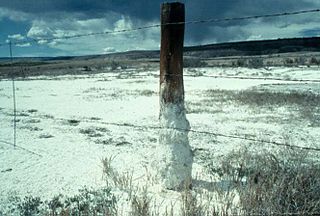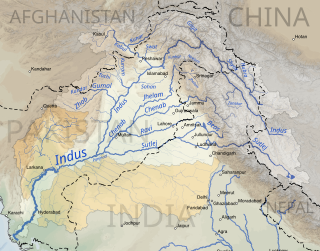
Soil salinity is the salt content in the soil; the process of increasing the salt content is known as salinization. Salts occur naturally within soils and water. Salination can be caused by natural processes such as mineral weathering or by the gradual withdrawal of an ocean. It can also come about through artificial processes such as irrigation and road salt.

Zulfikar Ali Bhutto was a Pakistani politician who served as the 9th Prime Minister of Pakistan from 1973 to 1977, and prior to that as the 4th President of Pakistan from 1971 to 1973. He was also the founder of the Pakistan People's Party (PPP) and served as its chairman until his execution in 1979.

Pakistan is one of nine states to possess nuclear weapons. Pakistan began development of nuclear weapons in January 1972 under Prime Minister Zulfikar Ali Bhutto, who delegated the program to the Chairman of the Pakistan Atomic Energy Commission (PAEC) Munir Ahmad Khan with a commitment to having the bomb ready by the end of 1976. Since PAEC, consisting of over twenty laboratories and projects under nuclear engineer Munir Ahmad Khan, was falling behind schedule and having considerable difficulty producing fissile material, Abdul Qadeer Khan was brought from Europe by Bhutto at the end of 1974. As pointed out by Houston Wood, Professor of Mechanical & Aerospace Engineering, University of Virginia, Charlottesville, in his article on gas centrifuges, "The most difficult step in building a nuclear weapon is the production of fissile material"; as such, this work in producing fissile material as head of the Kahuta Project was pivotal to Pakistan developing the capability to detonate a nuclear bomb by the end of 1984.

Dawn is Pakistan's oldest, leading and most widely read English-language newspaper and is newspaper of record. It is one of the country's three largest English-language dailies and the flagship of the Dawn Group of Newspapers. DAWN is published by Pakistan Herald Publications, which also owns the magazine Herald, the information technology magazine Spider, and the advertising marketing and media magazine Aurora.

The Indus Waters Treaty is a water-distribution treaty between India and Pakistan, brokered by the World Bank to use the water available in the Indus System of Rivers located in India. The Indus Waters Treaty (IWT) was signed in Karachi on September 19, 1960 by the first Prime Minister of India Pandit Jawaharlal Nehru and then President of Pakistan Ayub Khan.
Amrat Cola is a brand of cola beverage manufactured by the Pakistan Mineral Water Bottling Plant.

As of 2017, nuclear power in Pakistan is provided by 5 commercial nuclear power plants. Pakistan is the first Muslim country in the world to construct and operate civil nuclear power plants. The Pakistan Atomic Energy Commission (PAEC), the scientific and nuclear governmental agency, is solely responsible for operating these power plants. As of 2012, the electricity generated by commercial nuclear power plants constitutes roughly ~3.6% of electricity generated in Pakistan, compared to ~62% from fossil fuel, ~33% from hydroelectric power and ~0.3% from coal electricity. Pakistan is not a party to the Nuclear Non-Proliferation Treaty but is a member of the International Atomic Energy Agency. Pakistan plans on constructing 32 nuclear power plants by 2050.
Wind power is a form of renewable energy in Pakistan which makes up more than 6% of the total electricity production in the country. As of 2018, wind power capacity in Pakistan was 1,237 MW. The government is looking to increase the share of renewable energy and plans to add around 3.5 GW of wind energy capacity by 2018.
ICI Pakistan Limited is a Pakistani company which is based in Karachi, Pakistan.
China-Pakistan Power Plant Corporation is a corporation set up by the governments of China and Pakistan to build nuclear power plants in Pakistan and China.
Electricity in Pakistan is generated, transmitted, distributed, and retail supplied by two vertically integrated public sector utilities: Water and Power Development Authority (WAPDA) for all of Pakistan, and the Karachi Electric (K-Electric) for the city of Karachi and its surrounding areas. There are around 42 independent power producers (IPPs) that contribute significantly in electricity generation in Pakistan.

The automotive industry in Pakistan is the one of the fastest growing industries of the country, accounting for 4% of Pakistan's GDP and employing a workforce of over 1,800,000 people. Currently there are 3200 automotive manufacturing plants in the country, with an investment of ₨92 billion (US$870 million) producing 1.8 million motorcycles and 200,000 vehicles annually. Its contribution to the national exchequer is nearly ₨50 billion (US$470 million). The sector, as a whole, provides employment to 3.5 million people and plays a pivotal role in promoting the growth of the vendor industry. Pakistan’s auto market is considered among the smallest, but fastest growing in Asia. Over 180,000 cars were sold in the fiscal year 2014-15, rising to 206,777 units fiscal year 2015-16. At present, the auto market is dominated by Honda, Toyota and Suzuki. However on 19 March 2016, Pakistan passed the "Auto Policy 2016-21", which offers tax incentives to new automakers to establish manufacturing plants in the country. In response, Renault, Nissan, Kia, SsangYong, Volkswagen, Faw and Hyundai have expressed interest in entering the Pakistani market. NLC signed an agreement with Mercedes Benz for the manufacturing of Mercedes Actros trucks in Pakistan. Pakistan has not enforced any automotive safety standards or model upgrade policies. Obsolete vehicles including the Mehran, Bolan, Swift and Ravi continue to be sold by Pak Suzuki.

Fauji Fertilizer Company Limited (FFC) is the largest chemical fertilizer producer of Pakistan with biggest market share in the country. It was established by the Fauji Foundation which holds a controlling interest.

Pakistan has some of the highest values of insolation in the world, with eight to nine hours of sunshine per day, ideal climatic conditions for solar power generation. However, the country has been slow to adopt the technology.
Renewable energy in Pakistan is a relatively underdeveloped sector; however, in recent years, there has been some interest by environmentalist groups and from the authorities to explore renewable energy resources for energy production in light of the energy crises and power shortages affecting the country. Most of Pakistan's renewable energy comes from hydroelectricity.
China–Pakistan Economic Corridor(Chinese: 中国-巴基斯坦经济走廊; Urdu: پاكستان-چین اقتصادی راہداری; also known by the acronymCPEC) is a collection of infrastructure projects that are currently under construction throughout Pakistan. Originally valued at $46 billion, the value of CPEC projects is worth $62 billion as of 2017. CPEC is intended to rapidly modernize Pakistani infrastructure and strengthen its economy by the construction of modern transportation networks, numerous energy projects, and special economic zones. On 13 November 2016, CPEC became partly operational when Chinese cargo was transported overland to Gwadar Port for onward maritime shipment to Africa and West Asia, while some major power projects were commissioned by late 2017.
Jhimpir railway station is located at Jhimpir village, Thatta district of Sindh province, Pakistan. There is also Pakistan's first wind power plant Jhimpir Wind Power Plant. Jhimpir is 114 km (71 mi) away from Karachi.

Millat Tractors is a Pakistani tractor manufacturer based in Lahore, Punjab, Pakistan since 1965. It is the authorized assembler and manufacturer of Massey Ferguson tractors in Pakistan.












